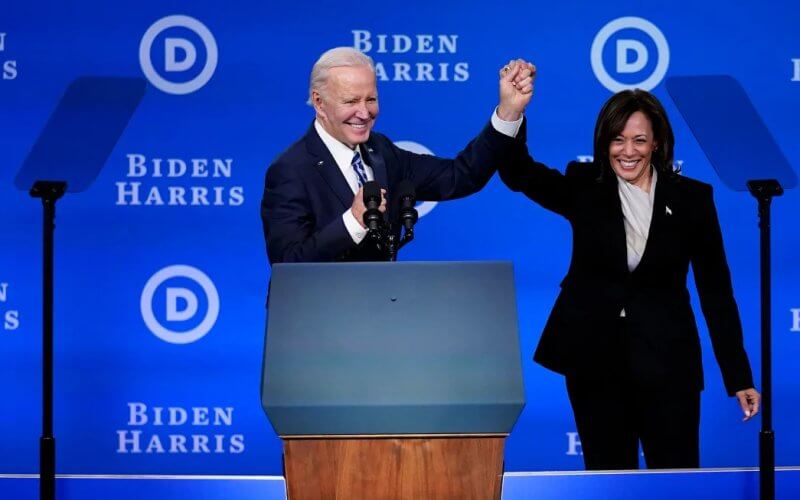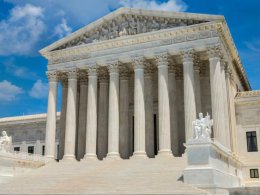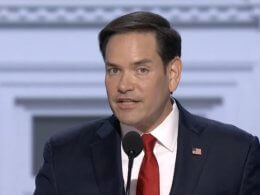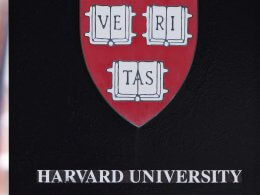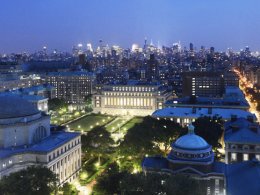By: Mary Lou Masters, Daily Caller News Foundation
Democrats who spoke with the Daily Caller News Foundation are concerned that the optics of the expected anti-Israel protests at the party’s nominating convention in August could harm President Joe Biden’s reelection campaign.
Biden has received criticism from his left flank over his support for Israel following the Oct. 7 Hamas terrorist attack, which killed roughly 1,200 people. The Democratic National Committee (DNC) is reportedly weighing options to minimize the effects such protesters could have on the convention, as dozens of organizations are set to join the “March on the DNC” when the event begins Aug. 19.
Several Democratic operatives are worried such demonstrations could resemble the 1968 convention, also in Chicago, where Republican Richard Nixon went on to defeat Democrat Hubert Humphrey months later.
“The anti-war protests in Chicago, fairly or unfairly, reinforced the reputation of the Democrats as the party of chaos, and reinforced Nixon’s pitch to the American people as the law and order candidate. And so I think those who ignore history are at risk of repeating it,” Len Foxwell, a Democratic strategist based in Maryland, told the DCNF.
“To the extent that people look at the images on their TV screens, or on their electronic digital devices, and see these rather unsympathetic protesters and associate them with the Democratic Party, it’s hard to see how it could have anything other than a deleterious effect on the campaign,” Foxwell added.
Violent riots broke out during the 1968 Democratic convention with individuals protesting the Vietnam War, while Nixon, who pledged to crack down on crime, quietly secured the GOP nomination in Miami, Florida. Nixon handily won the White House by a 20-point margin.
A Democratic pollster and redistricting consultant focused on working class racial minorities, who was granted anonymity to speak freely about his concerns, is skeptical former President Donald Trump could capitalize off of the protests like Nixon did. Still, the pollster said Democrats are concerned, telling the DCNF the historical context of the convention is “sort of eerily reverberant.”
“It’s not that these people stopped the war in Vietnam, they elected Richard Nixon, who ran very specifically against them,” the pollster said. “This is exactly the context that everybody is worried about with the optics for the convention.”
Steve Shurtleff, a Democratic New Hampshire lawmaker and former speaker of the state House, told the DCNF that while the pro-Palestinian activists have a right to protest, he hopes it “won’t turn into Chicago of 1968.”
“A bump that the president might get from the convention could be impacted by what’s happening on the streets, and I think of the ‘68 election, how close it was between Nixon and Hubert Humphrey … and I’ve often wondered if it had been a more peaceful convention, if [Humphry] could’ve gotten his message out to more people across America,” said Shurtleff.
Those close to Biden are pushing for bringing back parts of the 2020 convention, which was largely virtually-held due to the COVID-19 pandemic, according to Politico. The DNC is reportedly considering limiting in-person speeches; pre-taping the delegation roll-call; and moving some party business off of the convention floor.
Adolph Mongo, a Democratic strategist based in Michigan, told the DCNF that the party “should be concerned” about the optics of such protests, arguing that Biden already “has a lot on his plate.”
“He has folks in the black community not feeling it like they always used to feel for the Democratic candidate. He’s got students, they’re not feeling it. The Arab population is not feeling it. Then he’s got the immigration [issue],” said Mongo. “Man, he’s fighting several fronts.”
Biden has been losing ground with crucial voting blocs that typically back Democratic by large margins, including black and youth voters, according to polling this cycle. For instance, a New York Times/Siena College survey released May 13 found black voters supporting Biden over Trump 70% to 18%, and the president only held a four-point lead among 18-to-29-year-olds.
Black voters backed Biden at 87% in 2020 compared to only 12% who supported Trump, while the president won those aged 18 to 29 by 24 points, according to Edison Research exit polling.
Pro-Palestinian protests and encampments popped up on college campuses across the country before the school year ended, including at Columbia University, Emory College, Yale University, George Washington University and the University of California at Los Angeles. Various colleges cancelled classes or moved them online as the demonstrations broke out, with some making changes to graduation ceremonies, as well.
Trump has blamed Biden for the protests ensuing on college campuses, and accused him of being “nice” to Hamas while abandoning Israel.
Foxwell noted that the protests are not an issue to Republicans, as they “don’t need this constituency.”
“They actually benefit from the perception that they have a hostile relationship with this constituency, because so many of these protesters do come across as privileged complainers, and many of whom just are interested more in performance art than a legitimate policy discussion,” said Foxwell. “The Democrats do not have that luxury.”
Some of Biden’s primary victories this cycle have been marred by protest votes, with significant campaigns like the Uncommitted National Movement, formerly Listen to Michigan, and Abandon Biden encouraging those who disagree with the president’s handling of the war in Gaza to vote for nameless ballot options.
Over 100,000 Democratic primary voters in Michigan at 13.2% supported the “uncommitted” ballot option, as well as roughly 19% in Minnesota, nearly 10% in Washington, approximately 8% in Tennessee and 6% in Alabama, according to The Associated Press estimates. Other nameless ballot options secured 12.7% support in North Carolina, 9.4% in Massachusetts, 9% in Colorado and 8.4% in Wisconsin.
Conversely, Democratic strategist Andres Ramirez isn’t concerned about the optics of such demonstrations, and argued that “protests are nothing new to Democratic conventions.”
“We’ve seen very little impact that conventions or coverage of conventions have played on an actual outcome of an election,” Ramirez added. “I think what matters most to me, again, is where candidates and campaigns and their messaging will be, come September, when voters decide to tune in.”
Biden has yet to lead in the RealClearPolitics average against Trump since September 2023, and is currently down in every battleground state.
Neither Biden’s campaign nor the DNC responded to the DCNF’s requests for comment.





